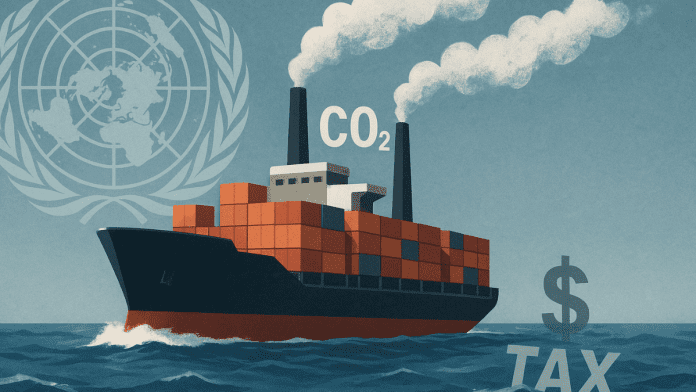🕒 Last updated on October 17, 2025
The United States has strongly spoken out against a new global carbon tax plan proposed by a United Nations organization. The plan aims to place a tax on carbon emissions from ships worldwide. President Donald Trump has made it clear that the U.S. will not follow this new rule, calling it unfair and harmful to American citizens and businesses.
The global plan is being discussed under the International Maritime Organization’s Net-Zero Framework. This framework is designed to reduce the amount of carbon released by ships, which are a major source of greenhouse gases. The plan would make shipping companies pay a fee based on how much carbon they emit. The money collected would then be used to encourage cleaner and greener practices in the shipping industry.
The proposal has caused a lot of controversy. Critics in the U.S., led by President Trump, describe it as a “Global Green New Scam Tax” that could raise costs for consumers. The government has warned that the tax could increase the price of goods shipped into the country. Officials also said it could create a large bureaucracy to manage the tax money, which they consider unnecessary and wasteful.
Strong Opposition From U.S. Officials
U.S. officials have publicly voiced their strong opposition to the global carbon tax plan. President Trump expressed his outrage on social media, saying the United States will not stand for this plan “in any way, shape, or form.” He also warned that the country will not tolerate increased prices on American consumers or the creation of a new international bureaucracy.
State Secretary Marco Rubio also echoed the opposition, saying the carbon tax would be a “hard NO” under the current administration. Rubio urged other countries to stand with the U.S. in defending its citizens and sovereignty.
The U.S. government, including Energy Secretary Chris Wright and Transportation Secretary Sean Duffy, issued a joint statement warning that nations supporting the carbon tax might face consequences. These could include visa restrictions, extra fees for ships docking in American ports, and other commercial penalties. This strong warning is part of a larger effort to protect U.S. economic interests and prevent what officials call an unfair global tax.
The debate is happening ahead of an important voting session at the International Maritime Organization. The vote will decide whether the carbon tax plan will be implemented. The U.S., led by President Trump, is one of several countries opposing the measure. Other nations, including parts of Europe and Asia, have shown support for the tax, aiming to reduce global shipping emissions.
Philippines works with UK to shape rules on carbon credits and renewable energy investment
Global Carbon Tax Plan and Its Implications
The global carbon tax is part of the International Maritime Organization’s Net-Zero Framework. It is considered the first plan of its kind to target shipping emissions worldwide. Shipping is responsible for a significant portion of global greenhouse gas emissions, and the framework seeks to reduce this impact.
The plan would apply mainly to large ships, which produce the majority of emissions in the industry. It is expected to start in 2028 if approved. Supporters of the plan say it will encourage shipping companies to adopt cleaner fuels and invest in greener technology.
However, U.S. officials, including President Trump, Marco Rubio, Chris Wright, and Sean Duffy, have argued that the plan could have serious economic consequences. Some studies estimate that it could increase shipping costs by 10% or more. This would make imported goods more expensive for American consumers. Officials also raised concerns about the creation of a new international bureaucracy to manage the tax funds.
The debate over this global tax plan highlights a clash between environmental initiatives and national economic interests. While the plan is meant to reduce emissions and fight climate change, it has faced strong resistance from countries worried about its economic impact.

